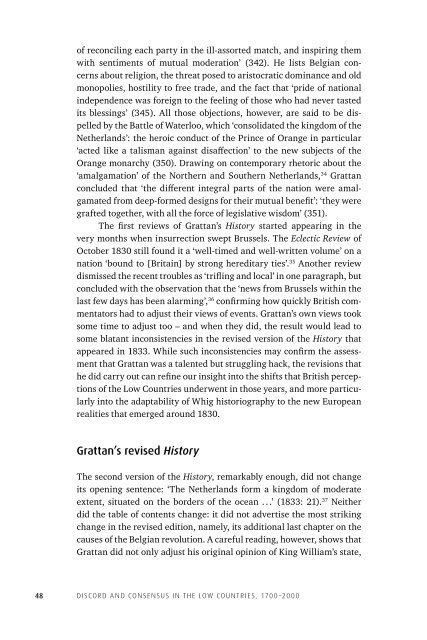Discord Consensus
7aze300jFJo
7aze300jFJo
Create successful ePaper yourself
Turn your PDF publications into a flip-book with our unique Google optimized e-Paper software.
of reconciling each party in the ill-assorted match, and inspiring them<br />
with sentiments of mutual moderation’ (342). He lists Belgian concerns<br />
about religion, the threat posed to aristocratic dominance and old<br />
monopolies, hostility to free trade, and the fact that ‘pride of national<br />
independence was foreign to the feeling of those who had never tasted<br />
its blessings’ (345). All those objections, however, are said to be dispelled<br />
by the Battle of Waterloo, which ‘consolidated the kingdom of the<br />
Netherlands’: the heroic conduct of the Prince of Orange in particular<br />
‘acted like a talisman against disaffection’ to the new subjects of the<br />
Orange monarchy (350). Drawing on contemporary rhetoric about the<br />
‘amalgamation’ of the Northern and Southern Netherlands, 34 Grattan<br />
concluded that ‘the different integral parts of the nation were amalgamated<br />
from deep-formed designs for their mutual benefit’: ‘they were<br />
grafted together, with all the force of legislative wisdom’ (351).<br />
The first reviews of Grattan’s History started appearing in the<br />
very months when insurrection swept Brussels. The Eclectic Review of<br />
October 1830 still found it a ‘well-timed and well-written volume’ on a<br />
nation ‘bound to [Britain] by strong hereditary ties’. 35 Another review<br />
dismissed the recent troubles as ‘trifling and local’ in one paragraph, but<br />
concluded with the observation that the ‘news from Brussels within the<br />
last few days has been alarming’, 36 confirming how quickly British commentators<br />
had to adjust their views of events. Grattan’s own views took<br />
some time to adjust too –and when they did, the result would lead to<br />
some blatant inconsistencies in the revised version of the History that<br />
appeared in 1833. While such inconsistencies may confirm the assessment<br />
that Grattan was a talented but struggling hack, the revisions that<br />
he did carry out can refine our insight into the shifts that British perceptions<br />
of the Low Countries underwent in those years, and more particularly<br />
into the adaptability of Whig historiography to the new European<br />
realities that emerged around 1830.<br />
Grattan’s revised History<br />
The second version of the History, remarkably enough, did not change<br />
its opening sentence: ‘The Netherlands form a kingdom of moderate<br />
extent, situated on the borders of the ocean . . .’ (1833: 21). 37 Neither<br />
did the table of contents change: it did not advertise the most striking<br />
change in the revised edition, namely, its additional last chapter on the<br />
causes of the Belgian revolution. A careful reading, however, shows that<br />
Grattan did not only adjust his original opinion of King William’s state,<br />
48<br />
DISCORD AND CONSENSUS IN THE LOW COUNTRIES, 1700–2000


